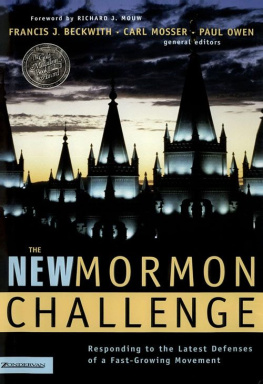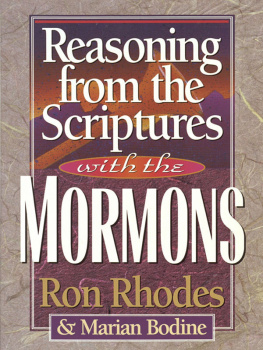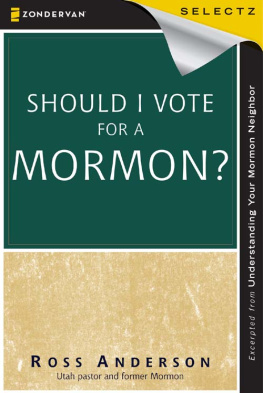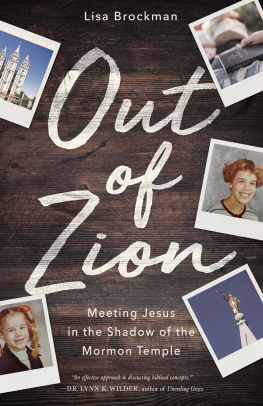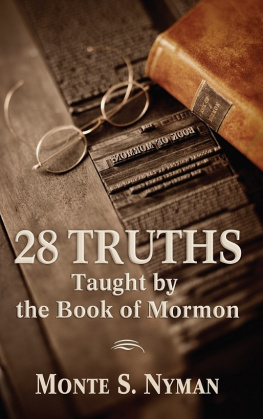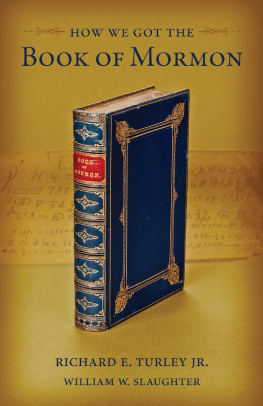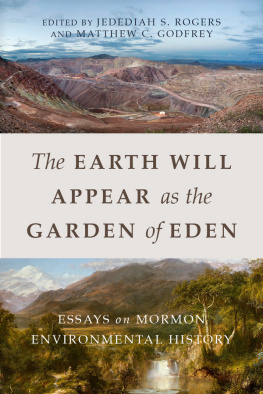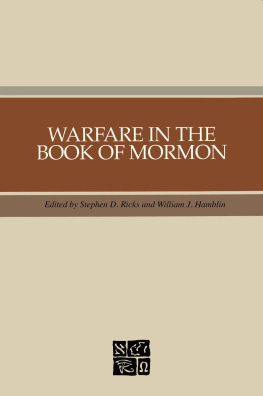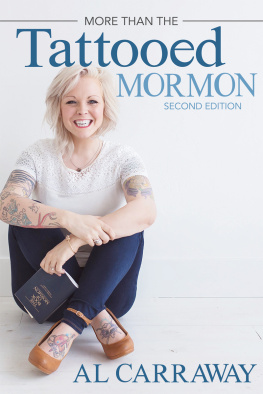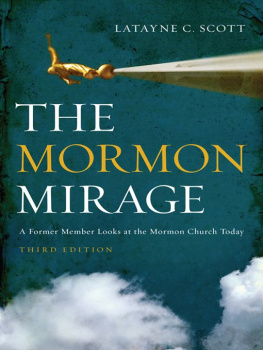The Newmormon Challenge
Responding to the Latest Defenses of a Fast-Growing Movement
Francis J. Beckwith Carl Mosser Paul Owen general editors

The defense of the faith should be of a scholarly kind. Mere denunciation does not constitute an argument; and before a man can refute successfully an argument of an opponent he must understand the argument that he is endeavoring to refute. Personalities, in such debate, should be kept in the background; and analysis of the motives of ones opponents has little place.
J. GRESHAM MACHEN
One of the grand fundamental principles of Mormonism is to receive truth, let it come from whence it may.
JOSEPH SMITH JR.
Table of Contents
T he publication of this book is an important event both for Protestant evangelicals and for Mormons. Until very recently the exchanges between evangelicals and members of the Church of Jesus Christ of Latter-day Saints (LDS) have been of a very poor quality. At their worst, they amounted to little more than the trading of insults. At their best, the two groups talked past each other, with both sides regularly setting forth oversimplified and distorted accounts of what the other group believed. In contrast, the essays in this book provide a respectful and sustained exploration of some key differences between some of the basic beliefs of classic Christianity and those of Mormonism. Written by a group of evangelical scholars representing several fields of philosophical and theological expertise, the respectful tone and responsible scholarship in these essays are relatively new phenomena in evangelical works on Mormonism and represent a welcome change.
I will not speak for the LDS folks here, but as an evangelical I must confess that I am ashamed of our record in relating to the Mormon community. To be sure, there are deep differences between our worldviews. I strongly disagree with what I understand to be traditional Mormon teachings about God, about human nature, and about what it takes for a sinner to get right with Godmatters on which the Latter-day Saints differ not only from standard Protestant teachings but from the Roman Catholic and Orthodox traditions as well. But none of those disagreements give me or any other evangelical the license to propagate distorted accounts of what Mormons believe. By bearing false witness against our LDS neighbors, we evangelicals have often sinned not just against Mormons but against the God who calls us to be truth-tellers.
The respectful tone of these essays, then, is a laudable attempt to set the record straightnot by coating over real disagreements, but by inviting our Mormon friends to engage in a mutual exploration of some of the most fundamental issues that bear on the human condition. This invitation is based on the conviction, stated explicitly in these pages, that these essays are not meant to be the last word spoken on any of the subjects covered. The conversation that takes place in this book is a sustained oneand it is offered with the expectation that what is said in these pages is only a first step in a discussion that needs to keep going. I hope the Mormon communityespecially LDS leaders and Mormon intellectualswill accept this invitation in the spirit in which it is offered.
The authors of these essays are obviously convinced that there are new opportunities these days for this sort of mutual exploration. Throughout its history, Mormonism has shown itself to be remarkably fluid in its theological perspective, and we have seen new signs of that fluidity in recent decades. The assumptions that allow for LDS theological fluidityespecially the strong emphasis on continuing revelationare troublesome for evangelicals. But those assumptions also allow for significant theological revision.
Much of the revising by Latter-day Saints, of course, takes the form of a change of emphasis rather than substance. But substantial revision is not out of the question. Nor are the signs of recent change limited to the areas directly addressed by the official LDS leadership. Many ordinary Mormons are listening to Christian radio and watching evangelical TV programs. Some of them subscribe to evangelical magazines. New forms of cooperative local activism have emerged in North America as Latter-day Saints, evangelicals, and Roman Catholics work together to counter destructive trends in the larger culture. And on occasion, as they get to know each other better, they are even praying and studying the Bible together!
The phenomenon that is most relevant to the present discussion, however, is the emergence over the past several decades of a community of gifted Mormon intellectuals who have earned the right to be taken seriously in the larger academic community. Not only has Brigham Young University proved itself to be an important center of intellectual activity, but LDS scholars can be found throughout the ranks of the North American academy. This fact by itself should dictate that evangelicals treat Mormonism differently than the other groups that we have typicallyand misleadinglylumped together as the cults. Christian Science has had almost no influence in the academy. And we are not being flippant in saying that the term Jehovahs Witness scholar has the feel of an oxymoron. But the existence of a highly intellectual Mormon subculturewhere LDS scholars engage in serious exploration of other perspectives and debate these matters openly among themselvessuggests that we would do well to treat the Mormon world-view as a serious intellectual perspective.
And this is precisely what is going on in these essays. I thank God for this book. I learned much from reading it. I am immensely pleased that these authors have made the effort to show the evangelical community what it is like to engage in a respectful and sustained exploration of a viewpoint with which we disagree on key points. And I am hopeful that Latter-day Saints will respond to the invitation to keep the conversation going. The issues at stake are not only utterly fascinatingthey have eternal significance!
RICHARD J. MOUW
PRESIDENT AND PROFESSOR OF CHRISTIAN PHILOSOPHY
FULLER THEOLOGICAL SEMINARY
Francis J. Beckwith (Ph.D., Fordham University) has published a number of articles on Mormonism in Trinity Journal, Criswell Theological Review , and other periodicals and is coauthor of The Mormon Concept of God and See the Gods Fall: Four Rivals to Christianity. He is associate professor of philosophy, culture, and law at Trinity International University. He is also a Fellow of the Center for the Renewal of Science and Culture, the Discovery Institute (Seattle). He lives in Anaheim Hills, California.
Carl Mosser (Ph.D. candidate, University of St. Andrews) has published significant articles on Mormonism in Trinity Journal and in the FARMS Review of Books (an LDS publication). He lives in St. Andrews, Scotland.
Paul Owen (Ph.D., University of Edinburgh) has published significant articles on Mormonism in Trinity Journal , in the FARMS Review of Books , and in Element: An E-Journal of Mormon Philosophy and Theology. He is assistant professor of Bible and religion at Montreat College. He lives in Asheville, North Carolina.
Jim W. Adams (Ph.D. candidate, Fuller Theological Seminary), Assistant Professor of Biblical Studies, LIFE Bible College, and Adjunct Professor of Biblical Studies, Azusa Pacific University.
Francis J. Beckwith (Ph.D., Fordham University), Associate Professor of Philosophy, Culture, and Law, Trinity International University.
Craig L. Blomberg (Ph.D., University of Aberdeen), Professor of New Testament, Denver Seminary.

